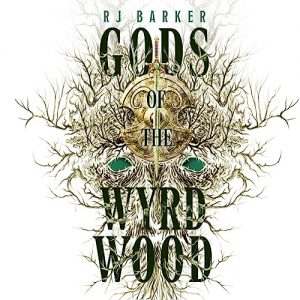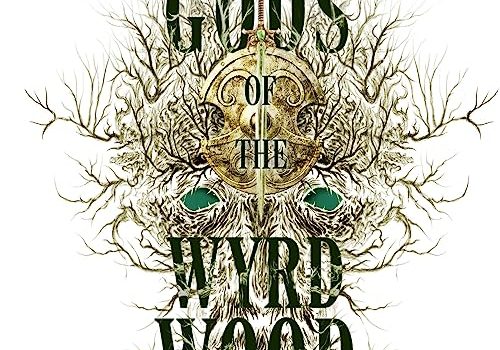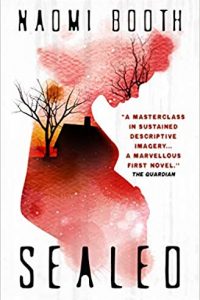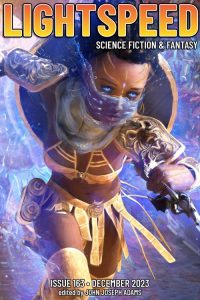Liz Bourke Reviews Gods of the Wyrdwood by R.J. Barker
 Gods of the Wyrdwood, R.J. Barker (Orbit 978-0356517230, £20.00, 640pp, hc) June 2023.
Gods of the Wyrdwood, R.J. Barker (Orbit 978-0356517230, £20.00, 640pp, hc) June 2023.
R.J. Barker’s Gods of the Wyrdwood is your classic epic fantasy. Barker has written two previous trilogies, each set in different worlds and engaging with different fantasy tropes. Gods of the Wyrdwood opens yet another trilogy, one in which Barker turns his attention (it seems) to fantasy’s long-held fascination with the idea of a chosen one.
Cahan Du-Nahere is an outcast, known to the nearest village, Harn, only as Forester: he ekes out a living from precarious farming and by navigating the dangerous Woodedge and Harnwood, where the true forest begins. The villagers of Harn in general dislike and despise him, clanless and an outsider. But once Cahan was something more, taken up as a child and promised to the god of fire, made to be a warrior who could burn the world. Because of his past and because of what he could be in future, the powers that rule his corner of the world would hunt him and put him to death if they knew where to find him.
They might soon discover he still survives, when a quirk of fate brings him alongside the teenaged Venn, child of the High Leoric of Harnspire. Venn desperately does not want to kill, but death is required to wake and feed his cowl – the symbiotic being that allows terrible feats of magic. Those who have a cowl are known as the Rai, and they feed their cowls through death and pain. Venn’s mother is pushing them to wake theirs, but Venn adamantly refuses. In the Woodedge, Venn hands themself back over to their mother’s people in order to keep Cahan safe a while longer, and Cahan starts to feel ashamed of not standing between others and harm. He has denied his cowl for years, refusing to feed it – refusing, if nothing else, to be cruel.
It’s not enough to overcome his desire for survival. But events and his own choices draw Cahan closer to the villagers of Harn, and they to him. When the five-year-old son of the village’s Leoric – its mayor of sorts – is foreststruck, disappearing into the heart of the Wyrdwood, Cahan chooses to seek him to bring him back. Journeying into the heart of the forest with the monk Udinny, a servant of Ranya, perhaps the only god in all the land who does not demand cruelty of her worshippers, he forges bonds than turn out to bind his fate to that of the villagers. When the Rai arrive in Harn looking for him, Harn will pay the price if he fails to hand himself over to them. And when Cahan overcomes the first attempt to capture him, Harn faces the full might of the armies of the Rai. Cahan can help them hold off these forces long enough to escape into the forest… but only if he’s very lucky, and if no one betrays him from within. In this struggle, he’s about to learn that not everything he was taught about his power is the truth: the older, stranger powers of the Wyrdwood are gods in their own right, and they have an interest in him.
This is a fascinating, compelling novel. Cahan is a vivid and interesting character, a man who has essentially given up hope in anything worth fighting for, living only because he doesn’t want to die, but who begins over the course of the novel to make connections, to make friends, to, in a sense, come back to life. Venn, too, is an interesting character, though we never get their direct perspective: their mother, the High Leoric, whose viewpoint we do get, is also compelling. She’s rather self-deluding and unpleasant, but sympathetic: you can see how her experiences made her what she is.
One of the most fascinating aspects of Gods of the Wyrdwood, though, is the worldbuilding. The worldbuilding is a puzzle only gradually revealed (I doubt Barker has shown his whole hand in this one volume), with its array of strange gods, with its cowls and its Cowl-Rais and its constant war. Victory means the world will ‘‘tilt’’ and warmth return to the north – an idea I first thought was metaphor. It turns out to be literal. Barker creates an alien biosphere, filled with jellyfish-like gasmaws and spearmaws that float through the air, cow-like crownheads and large insect-like orits, in addition to the other strangenesses of the Wyrdwood: intelligent rootlings shaped by the impulses of the wood itself, skeletal swarden with their unknowable impulses, crown trees vast beyond imagining, and the of boughry, the gods of the deep wood, alien in their powers and necessities.
Outside the wood, the world of Crua is one where religion and magic are tightly linked, but this is a world where power is cruel by nature and by training. The cowls of the Rais grow stronger by inflicting pain, and the Rais live a long time with their symbiotes, growing crueller and crueller with age: this is a world where the strong do what they wish, and everyone of lesser strength must either yield or hope to be ignored. But Cahan’s and Venn’s experiences at the climax of Gods of the Wyrdwood hint that feeding on death and pain is not intrinsically necessary to the cowls: that perhaps this entire system is this way out of nurture, not nature, and other choices are possible.
Perhaps not, too, but I’m fascinated with what Barker’s done here and where he’s going next. Gods of the Wyrdwood is an excellent book, tightly bound up with the village of Harn and in Cahan’s emotional journey– at times it’s a very intimate, even claustrophobic novel – with epic themes, epically strange worldbuilding, and excellent action scenes. (Barker can write a damn good fight scene, and those scenes are all the more interesting because Cahan isn’t an unbeatable tank, but a man who turned his back on war and hasn’t kept in training, and gets his arse handed to him several times by younger fighters in better training.) I really enjoyed it, and I’m very much looking forward to the next instalment.
Liz Bourke is a cranky queer person who reads books. She holds a Ph.D in Classics from Trinity College, Dublin. Her first book, Sleeping With Monsters, a collection of reviews and criticism, is out now from Aqueduct Press. Find her at her blog, her Patreon, or Twitter. She supports the work of the Irish Refugee Council and the Abortion Rights Campaign.
This review and more like it in the August 2023 issue of Locus.
 While you are here, please take a moment to support Locus with a one-time or recurring donation. We rely on reader donations to keep the magazine and site going, and would like to keep the site paywall free, but WE NEED YOUR FINANCIAL SUPPORT to continue quality coverage of the science fiction and fantasy field.
While you are here, please take a moment to support Locus with a one-time or recurring donation. We rely on reader donations to keep the magazine and site going, and would like to keep the site paywall free, but WE NEED YOUR FINANCIAL SUPPORT to continue quality coverage of the science fiction and fantasy field.
©Locus Magazine. Copyrighted material may not be republished without permission of LSFF.








